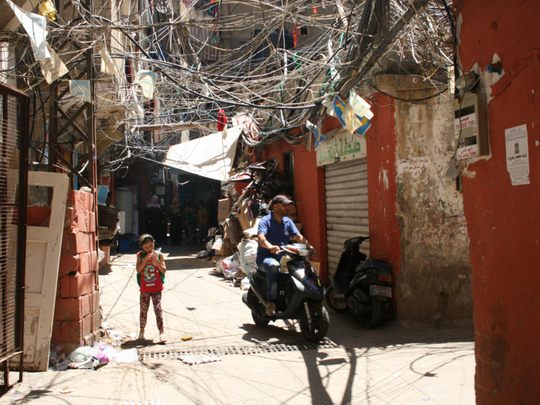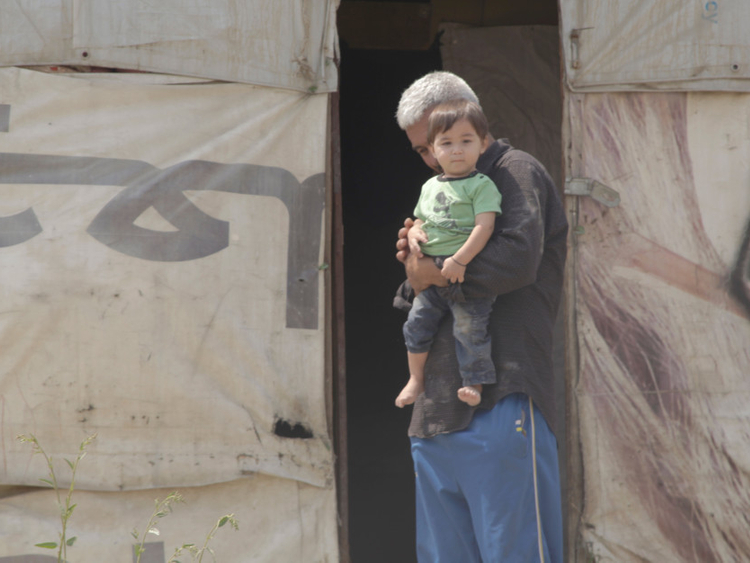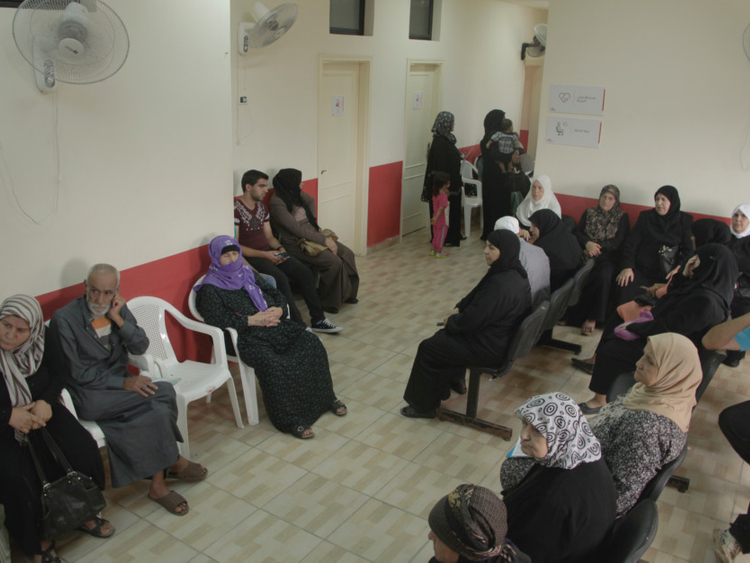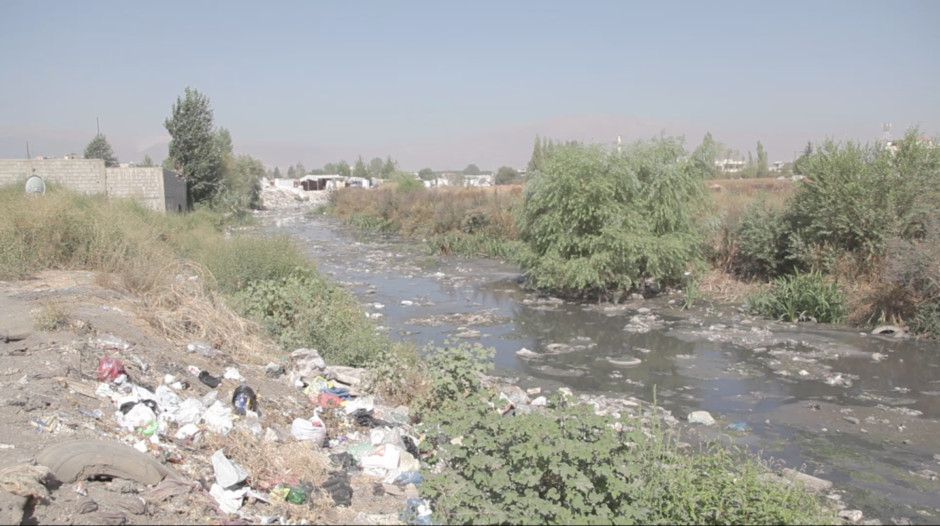
A hot wind is blowing through the camp, bringing with it a nauseating stench. It’s coming from the banks of River Litani, where the grey water is curdling with lumps of plastic and human waste. Just a few yards away, one-year-old Mohammad is crawling out of a makeshift tent, laughing as he ventures towards his father, fingering the dirt as he goes.
“We have been here for almost four years and nothing has changed,” says Mohammad’s father, Fouad Al Salim. “We were forced to leave our homes in Aleppo ... There was intense bombing and snipers everywhere in my neighbourhood. Every day in the village two or three people would die — young people,” says the 22-year-old.
Fouad is a refugee in Majdal Anjar, Lebanon, on the border with Syria, who lives in an informal tented settlement (ITS) in the dusty Bekaa Valley, in squalid conditions. Unlike formal refugee camps provided by the UN refugee agency (UNHCR), which provide shelter, water and sanitation facilities, the refugees here have to pay private landowners for a spot of dirt where they build shelters from any scraps they can get their hands on.
“There are a lot of refugees who haven’t got any help from the UN, some people get plenty, and some like us, get nothing,” says Fouad. “You see the situation here, it’s hot and there is no water ... it’s very rare for water to be available.”
The UNHCR did identify possible lands for medium-sized formal camps here, but these proposals were rejected by the Lebanese government for security reasons — stating that camps near the Syrian border could be used by armed fighters for recruitment or deepening the insecurity already prevalent in the border areas.
As a result, some of the most vulnerable refugees here are struggling to obtain enough water for sanitation. Mohammad’s face is brown with dirt, his fingernails and feet encrusted black. Fouad and the other families here pay $50 (Dh184) a month to live on this land, a cheaper price than normal because it sits next to the banks of Litani, which has become increasingly polluted due to the area’s bad sewage system. The river reeks of faeces and is causing various medical problems for the people living next to it.
“There are 30 families living in 25 tents here, and the majority of the children suffer from various medical problems such as asthma, severe diarrhoea, scabies and lice, not to mention the awful smell they have to endure daily,” says Sami Moussa, community health worker for Médecins Sans Frontières (MSF).
“There are also two other camps just up the river, which are larger, each with 50 families — all of whom suffer illnesses from living near this polluted river,” says Moussa.
Due to the enormous influx of refugees since the Syrian conflict began in 2011, the Lebanese government, which hasn’t had an elected president for more than two years, has struggled to support the vast numbers entering the country. Registered refugees have access to primary health care (PHC) through existing Lebanese healthcare structures, which is partially paid for by the UNHCR and partially by patients. However, those who are not registered — an estimated 400,000 who often don’t register for fear of being sent back to Syria — are not permitted PHC.
Just a few kilometres from Fouad’s settlement, MSF hosts a clinic that offers PHC, as well as a mother-and-child care unit, free of charge for all refugees, registered or not. Here patients receive treatment for acute conditions and chronic diseases, such as respiratory problems and diabetes, while women receive prenatal, child delivery and postnatal care. It’s a vital helping hand in a place where many refugees have nowhere else to turn.
In the Majdal Anjar clinic, Maha Al Nasri (name changed to protect identity) is lying in the post-delivery room next to her newborn. “I named her Jana [heaven],” says Al Nasri, who escaped from Al Ghouta in Syria with her husband and four children two-and-a-half years ago, after their home was bombed.
“We live close to the clinic and my other children get treated here. They have been so good to us and we thank God for that,” she says. “Life is hard here, especially getting money for house rent, which is very expensive, and often my husband goes months without finding any work. But we thank God, because it is better than living under [the threat of] bombs.”
According to Lebanese law, refugees are not allowed to work in the country without a permit. Lebanon’s social affairs minister Rashid Derbas has described opening up the country’s job market to Syrian refugees as neither “possible” or “appropriate”. As a result, many Syrians work illegally, for extremely low wages, doing anything they can get their hands on — from potato picking to construction — to earn enough for their rent.
The official number of Syrian refugees in Lebanon, cited by the UNHCR, stands at nearly 1.1 million, but with masses of unregistered Syrians secretly crossing the border in desperate droves, the Lebanese government estimates the figure to be closer to 1.5 million, and with Palestinian and Iraqi refugees on top of that, this means around a quarter of the country’s population is refugees — a higher number per capita and per square mile than any other country in the world.
In Beirut, Syrians have become a part of the multilayered scenery, from shoe shiners and flower-sellers outside bustling bars, to mothers coaxing semi-conscious children on side streets begging for money.
Of the 300,000 registered Syrians in the city, the majority live in abandoned buildings or Palestinian refugee camps, paying about $200 per month for accommodation. One such camp, Shatila in southern Beirut, houses nearly 20,000 Syrians.
Here, dilapidated concrete buildings are stacked like Jenga pieces on top of each other, while electrical wires sprawl along the narrow filthy streets, sometimes even dangling in muddy water where barefoot children play.
MSF has two clinics in Shatila, one focusing on PHC and another on mother-and-child care. They are invariably heaving with patients needing treatment and medication, often caused by unhygienic living conditions, malnutrition and lack of sanitation. More than 70 per cent of Syrian refugees in Lebanon live below the poverty line and are rely heavily on humanitarian aid, according to the UN.
MSF’s Shatila clinic alone treats nearly 150 children per day.
“We see many children who suffer from scabies and anaemia, the latter of which is caused by malnutrition, as their parents cannot afford a proper diet,” says Nada Farhat, paediatrician at MSF Shatila, who herself fled Syria after the war began in 2011. “The children also live in cramped and overcrowded conditions. Often there are two or three families living in one small apartment, with up to 25 people sharing the space. This often leads to many illnesses spreading.”
Sitting in the packed waiting room of the clinic is Samiha Meshref, a 65-year-old woman from Homs, Syria, who lives with her daughter and four grandchildren in Shatila.
“The conditions in the camp are very bad, there are many rats,” says Meshref, who fled Syria with her family after her youngest son was killed. She suffers from diabetes and visits the clinic every month for treatment and medication. “My grandchildren also come here for treatment, if this clinic didn’t exist I don’t know what we’d do,” she says.
“My dream is to take my family to a better country where they give us a place to stay and better conditions as I have no hope to return to Syria. Everything we had there has been destroyed.”
With Lebanon bursting at the seams with refugees in desperate conditions, officials from developing countries are calling on world powers to do more to extend aid amid the crisis. Ahead of the UN summit for refugees and migrants this month, the Lebanese ambassador to the UN, Nawaf Salam, requested world leaders to do more for hosting nations and refugees alike.
“There are no commitments in terms of responsibility-sharing, no agreement on relocation of refugees, no real commitment to developing funds that could address the needs of refugee and host communities,” said Salam. “We need to give more help to host communities. And we need to prepare plans for a safe and dignified return [of Syrians to Syria] ... That’s not implementable today, but preparations need to start today, to be implemented when conditions permit.”
Back in Majdal Anjar, Fouad is returning to his camp from a day of grafting in the fields. He earns up to $6 for a full day’s work. “We can only cover our basic needs, that’s our maximum; providing milk and diapers for the kids,” says Fouad. “This is our situation, but we’re trying to improve it.”
As the children play in the evening dust, and a mother bathes her baby in a bucket, a group of men is talking over a pot of tea in the last of the day’s sunlight. A dozen metres away the sound of music and laughter can be heard. “There’s a wedding in the next camp,” says Fouad, smiling. He lifts up the torn and ragged fabric that acts as his front door, and with Mohammad in his arms, returns home.
Faris Al-Jawad is a writer with GN Magazines.















